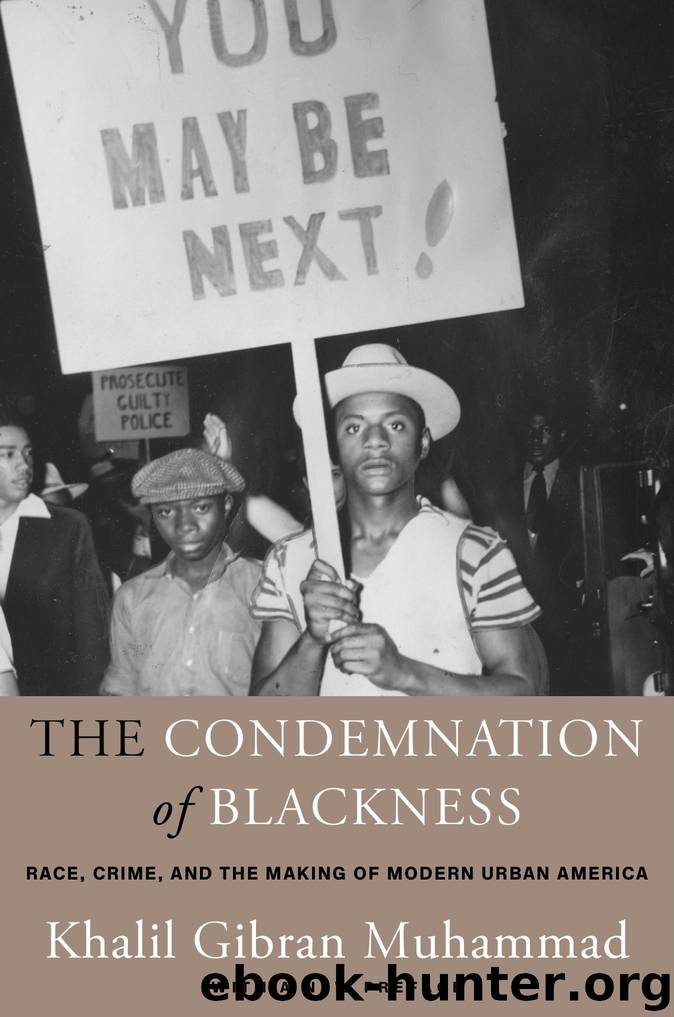The Condemnation of Blackness by Khalil Gibran Muhammad

Author:Khalil Gibran Muhammad
Language: eng
Format: epub
Publisher: Harvard University Press
5
FIGHTING CRIME:
POLITICS AND PREJUDICE IN THE CITY OF BROTHERLY LOVE
The pace of crime prevention among progressives that began at the dawn of the twentieth century accelerated during the second decade. Social, moral, and political reform also continued to gain the lion’s share of their attention. Although these reformers were sometimes fierce critics of industrialization’s hunger for cheap labor and insensitivity to the quality of workers’ lives, they mostly chose to wage battles outside the workplace. Soliciting the financial support of business owners and participating on the boards of various social agencies, progressives rarely challenged the inherent inequalities in the economic system. A conflicting story emerges when one compares what these liberals believed with what they were willing to fight against. They claimed that crime was more a function of economic forces than of individual moral failure, yet between 1911 and 1917 many of them initiated or supported vice crusades in major cities such as Chicago, New York, Philadelphia, and New Orleans. Their actions spoke louder than their words as they formed urban vice commissions to investigate and eliminate prostitution, gambling, and illegal drug use and trafficking. Like the settlement house movement, the movement to close red-light districts—the Tenderloin, as the district was called in Philadelphia—focused once again on the symptoms of inequality rather than on the causes, and this movement was as profoundly racialized.
Race mattered to city officials and reformers who hired former pimps and prostitutes to infiltrate the disorderly houses and gambling dens of Philadelphia in the spring of 1912. But proof of this claim is not necessarily revealed by the mistreatment of African Americans by Philadelphia’s Vice Commission or its hired guns. Black reformer James Stemons had fought long and hard to bring black criminality to the attention of city authorities. Stemons had even credited himself for giving Mayor Rudolph J. Blankenburg the idea to commence a wide-scale assault on vice in Philadelphia with the help of ministers and reformers. That Stemons and the many supporters of the League of Civic and Political Reform (LCPR) demanded a coordinated response of concerned citizens and public officials to stamp out crime shows that blacks did not necessarily see aggressive crime fighting as inherently harmful to the race. For this reason, the work of the Vice Commission should have signaled a hopeful sign to black reformers that a broader effort was afoot to improve the quality of life for everyone: whites, immigrants, and blacks.
A major concern expressed by African Americans such as Du Bois, Stemons, and writers for the Philadelphia Tribune was that crime prevention among blacks had been too long ignored. There was also a booming body of evidence that anticrime forces that did descend on black communities acted with impunity and disregarded the individual rights of black citizens. In this thicket of paradoxical worries, blacks themselves contributed to the racialization of crime prevention by linking racial progress to crime fighting. In other words, although blacks needed the help of the city’s mostly white police force to catch criminals regardless of race, blacks advocated crime fighting on the basis of what was good for the black community.
Download
This site does not store any files on its server. We only index and link to content provided by other sites. Please contact the content providers to delete copyright contents if any and email us, we'll remove relevant links or contents immediately.
| African-American Studies | Asian American Studies |
| Disabled | Ethnic Studies |
| Hispanic American Studies | LGBT |
| Minority Studies | Native American Studies |
Cecilia; Or, Memoirs of an Heiress — Volume 1 by Fanny Burney(32558)
The Great Music City by Andrea Baker(32019)
Cecilia; Or, Memoirs of an Heiress — Volume 2 by Fanny Burney(31956)
Cecilia; Or, Memoirs of an Heiress — Volume 3 by Fanny Burney(31942)
We're Going to Need More Wine by Gabrielle Union(19046)
All the Missing Girls by Megan Miranda(16029)
Pimp by Iceberg Slim(14508)
For the Love of Europe by Rick Steves(14121)
Bombshells: Glamour Girls of a Lifetime by Sullivan Steve(14076)
Talking to Strangers by Malcolm Gladwell(13370)
Norse Mythology by Gaiman Neil(13366)
Fifty Shades Freed by E L James(13242)
Mindhunter: Inside the FBI's Elite Serial Crime Unit by John E. Douglas & Mark Olshaker(9343)
Crazy Rich Asians by Kevin Kwan(9292)
The Lost Art of Listening by Michael P. Nichols(7506)
Enlightenment Now: The Case for Reason, Science, Humanism, and Progress by Steven Pinker(7314)
The Four Agreements by Don Miguel Ruiz(6765)
Bad Blood by John Carreyrou(6622)
Weapons of Math Destruction by Cathy O'Neil(6281)
